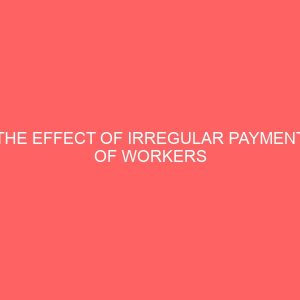Description
Concept of Foreign Direct Investment in Nigeria
An agreed framework definition of foreign direct investment (FDI) exists in theliterature. That is, FDI is an investment made to acquire a lasting managementinterest (normally 10% of voting stock) in a business enterprise operating in acountry other than that of the investor defined according to residency (World Bank, 1996). Such investments may take the form of either “greenfield†investment (also called “mortar and brick†investment) or merger and acquisition (M&A), which entails the acquisition of existing interest rather than new investment.
In corporate governance, ownership of at least 10% of the ordinary shares or voting stock is the criterion for the existence of a direct investment relationship. Ownership of
less than 10% is recorded as portfolio investment. FDI comprises not only merger and
acquisition and new investment, but also reinvested earnings and loans and similar capital transfer between parent companies and their affiliates. Countries could be both host to FDI projects in their own country and a participant in investment projects in other counties. A country’s inward FDI position is made up of the hosted FDI projects, while outward FDI comprises those investment projects owned abroad.
One of the most salient features of today’s globalization drive is conscious encouragement of cross-border investments, especially by transnational corporations and firms (TNCs). Many countries and continents (especially developing) now see attracting FDI as an important element in their strategy for economic development. This is most probably because FDI is seen as an amalgamation of capital, technology, marketing and management.
Sub-Saharan Africa as a region now has to depend very much on FDI for so many reasons, some of which are amplified by Asiedu (2001). The preference for FDI stems from its acknowledged advantages (Sjoholm, 1999; Obwona, 2001, 2004). The effort by several African countries to improve their business climate stems from the desire to attract FDI. In fact, one of the pillars on which the New Partnership for Africa’s Development (NEPAD) was launched was to increase available capital to US$64 billion through a combination of reforms, resource mobilization and a conducive environment for FDI (Funke and Nsouli, 2003).
Unfortunately, the efforts of most countries in Africa to attract FDI have been futile. This is in spite of the perceived and obvious need for FDI in the continent. The development is disturbing, sending very little hope of economic development and growth for these countries. Further, the pattern of the FDI that does exist is often skewed towards extractive industries, meaning that the differential rate of FDI inflow into sub-Saharan African countries has been adduced to be due to natural resources, although the size of the local market may also be a consideration (Morriset 2000; Asiedu, 2001).
Nigeria as a country, given her natural resource base and large market size, qualifies to be a major recipient of FDI in Africa and indeed is one of the top three leading African countries that consistently received FDI in the past decade. However, the level of FDI attracted by Nigeria is mediocre (Asiedu, 2003) compared with the resource base and potential need. Further, the empirical linkage between FDI and economic growth in Nigeria is yet unclear, despite numerous studies that have examined the influence of FDI on Nigeria’s economic growth with varying outcomes (Oseghale and Amonkhienan, 1987; Odozi, 1995; Oyinlola, 1995; Adelegan, 2000; Akinlo, 2004).
Most of the previous influential studies on FDI and growth in sub-Saharan Africa are multi country studies. However, recent evidence affirms that the relationship between FDI and growth may be country and period specific. Asiedu (2001) submits that the determinants of FDI in one region may not be the same for other regions. In the same vein, the determinants of FDI in countries within a region may be different from one another, and from one period to another.
Foreign direct investment (FDI) is an investment made to acquire a lasting management interest (normally 10% of voting stock) in a business enterprise operating in a country other than that of the investor defined according to residency (World Bank, 1996). Such investments may take the form of either “greenfield†investment (also called “mortar and brick†investment) or merger and acquisition (M&A), which entails the acquisition of existing interest rather than new investment.
One of the most noticeable features of today’s globalization drive is conscious encouragement of cross-border investments, especially by transnational corporations and firms (TNCs). Many countries (especially developing) now see attracting FDI as an important element in their strategy for economic development. This is most probably because FDI is seen as an amalgamation of capital, technology, marketing and management. Africa as a region now has to depend very much on FDI for so many reasons, some of which are amplified by Asiedu (2001). The preference for FDI stems from its acknowledged advantages (Sjoholm, 1999; Obwona, 2001, 2004). The effort by several African countries to improve their business climate stems from the desire to attract FDI. In fact, one of the pillars on numerous studies that have examined the influence of FDI on Nigeria’s economic growth with varying outcomes (Oseghale and Amonkhienan, 1987; Odozi, 1995; Oyinlola, 1995; Adelegan, 2000; Akinlo, 2004). Most of the previous influential studies on FDI and growth in sub-Saharan Africa are multi country studies. However, recent evidence affirms that the relationship between FDI and growth may be country and period specific. Asiedu (2001) submits that the determinants of FDI in one region may not be the same for other regions. In the same vein, the determinants of FDI in countries within a region may be different from one another and from one period to another (Kolawole and Henry, 2009).
Studies on FDI and economic growth in Nigeria are not complete in agreement in their submissions. A closer examination of these previous studies reveals that conscious effort was not made to take care of the fact that more than 60% of the FDI inflows into Nigeria is made into the extractive (oil) industry.
Nigeria is a country endowed with arable land and abundant natural resources. Government policies have been directed towards ensuring that what nature has provided is harnessed and utilized to the fullest for the benefit of the citizenry. Thus, Government policies and strategies towards foreign investments in Nigeria are usually shaped by two principal objectives: the desire for economic independence and the demand for economic development (Garba, 1998).
Todaro (1994) notes that the primary factors which stimulate economic growth are investments that improve the quality of existing physical and human resources, that increase the quantity of these same productive resources and that raise the productivity of all or specific resources through invention, innovation and technological progress. FDI contributes to GDP growth rates and is seen as a vital tool for economic progress.
Osaghale and Amenkhieman (1987) conducted an investigation to determine whether foreign capital inflows, oil revenues and foreign borrowing had any positive impact on the economic growth of Nigeria. They found that Nigeria’s revenue from oil export increased between 1970 and 1982 and that there was a substantial growth in her total foreign debts and FDI. The study also showed that there was a positive relationship between FDI and Gross Domestic Product (GDP). The study concluded that the economy would perform better with greater inflow of FDI; and recommended that less developed countries (LDCs) should create more conducive environments for FDI.
Edozien (1968) stresses the linkages generated by foreign investment and its impact on the economic growth of Nigeria. He contends that FDI induces the inflow of capital, technical know-how and managerial capacity which accelerate the pace of economic growth. He also observed the pains and uncertainties that come with FDI. Specifically, he noted that foreign investment could be counter
productive if the linkages it spurs are neither needed nor affordable by the host country; and concluded that a good test of the impact of FDI on Nigeria’s economic growth is how rapidly and effectively it fosters, innovates or modernizes local enterprises.
Aremu (2003) observes that foreign firms can raise the level of capital formation, promote exports and generate foreign exchange. Indeed, the role of FDI in capital formation in Nigeria has been increasing over the years. FDI/GCF (Gross Capital Formation) rose from 7.3% in 1974 to about 17% in 1985, although it was generally low in the late 1970s and early 1980s. For example, FDI only contributed 1.5% to GDP growth in 1976 and 0.5% in 1982. The relatively low level of FDI in total capital formation in these periods was similar to that of Korea and Taiwan, which had emphasized minimal levels of reliance on foreign investment. In contrast to this, were some South East Asian countries which had the policy of attracting FDI, for example, Indonesia. Nigeria retarded the contribution of FDI to gross capital formation during this period using infant industry protection, local content rules, FDI restrictions and other restrictive policies. The relative rise in the share of FDI in capital formation since 1993 has been due to rapid loosening of controls and regulations on the activities of multinational corporations in Nigeria. As a result, FDI/GCF ratio rose from 6.4% in 1986 to 32% in 1993 and 49% in 1998 (Fabayo, 2003).
The linkage between investment and growth does not mean that capital accumulation is the sole determination of economic growth in Nigeria. FDI may also influence investment by domestic firms and by other foreign affiliates. An IMF study based on 69 countries over the period 1970–1989 found that FDI from developed countries stimulated domestic investment (Borensztein et al, 1998).
Thus, Odozi (1995) posits that FDI appears to be the most crucial component of capital inflow Nigeria should seek to attract in the light of her current economic circumstances. Many studies, however, indicate that the impact of FDI is limited or even negative sometimes.
In a study of Nigeria, Onimode et al (1983) found that where FDI was directed at import substituting firms, the value of imports was observed to be greater than the value added produced. This type of FDI would give rise to outflows of investment income and high cost of imported inputs which adversely affect growth. Ohiorheman (1993) asserts that with the research and development (R&D) concentrated in the head offices of multinational corporations (MNCs), technology transfer was limited. He added that even though the MNCs provided local training programs, Nigerians were intricacies of machinery construction or installation. Consequently, their innovative ability was not enhanced. He concluded that, to the extent the MNCs dominated the manufacturing sector, their activities generated little multiplier effects and the linkage effects were generally low in the (manufacturing) sector.
Using indices of dependence and development as a mirror of Nigeria’s economic performance, Oyaide (1977) concluded that FDI engineer both economic dependence and growth. In his opinion, FDI causes and catalyzes a level of growth that would have been impossible without such investment. This is, however, at the cost of economic dependence.
Although a lot of studies indicate that there exists a positive relationship between FDI and economic growth in Nigeria, there is a consensus among economists that the country’s growth rate would have a positive impact on FDI. The prospect that FDI will be profitable is brighter if the nation’s economic health is better and the growth rate of GDP is higher.







